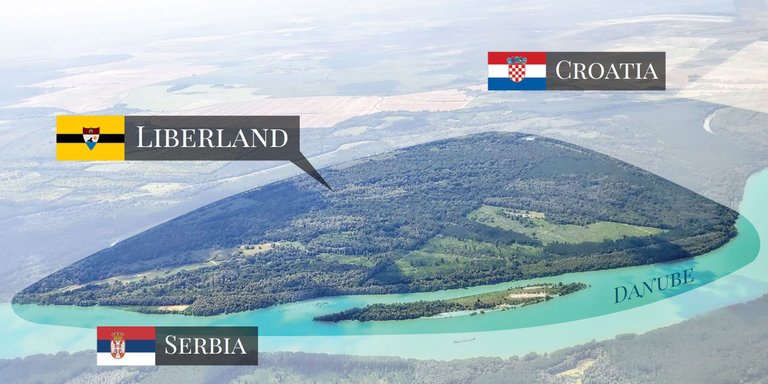
https://liberland.org/news/636-the-curious-case-of-croatias-diplomatic-notes
One of Croatia’s biggest legal tricks in the ongoing Liberland saga—currently with around 75 cases in Croatian courts and counting—revolves around an exchange of diplomatic notas between the Ministries of Foreign Affairs of Croatia and Serbia. Let us learn about them in this article.
Just before Liberland officially opened on August 6, 2023, Croatia’s Ministry of Foreign Affairs exchanged letters with Serbia’s Ministry of Foreign Affairs. The result? Diplomatic notas in which Croatia asked Serbia if they were okay with Croatian authorities carrying out certain border control activities in the Liberland area.
Serbia, seeing a chance to make a point, responded with congratulations—finally, Croatia was taking responsibility for the area! And of course, Serbia had no objections. This makes sense, as Serbia considers the land to be Croatian or in any case not Serbian. For reference, one might recall a statement from 24th April 2015 about the formation of Liberland in Gornja Siga, where the same Serbian ministry stated “... the position of the Republic of Serbia regarding the state border is that it runs along the middle of the Danube waterway, in accordance with the legal demarcation from 1945, and that the “new state” was not formed on the territory of the Republic of Serbia.”
Here’s the catch: Croatia does not see it that way. Croatia believes that Liberland is Serbia, which is also a fundamental piece of context for its request formulated in its diplomatic nota: you, Serbia, the sovereign over the land, please give us the right to police the land since you seem not to.
Pretzels, Boots and Disagreements
This type of “nuance” is relevant in law. If one assumes, for good reasons (e.g. vague text, being mislead by advertisement), that he is entering a contract about buying pretzels but the other side in fact sends a pair of old boots, then this was technically not a valid contract (e.g. for the boots) even if the buyer (ex post) likes having received said boots and the seller does not react. It could, in fact, have been a valid contract for pretzels and the seller is now in default. Let us see how the higher courts tackle this matter.
The Croatians subsequently assumed, without any good cause, that there was at least an unspoken understanding between the two parties that Croatia would be handling border checks, and so, Croatia decided to act.
Of course, border control means just that—monitoring the border, not overseeing the disappearance of bicycles, washing machines, Starlink terminals, and fully furnished houseboats… and definitely not managing anything related to Hrvatske Šume d.o.o. Therefore, Croatia almost immediately breached the scope of the mandate given by Serbia even if we ignored the fact that there likely was no deal made and therefore no mandate, due to the complete disagreement between the parties on the fundamental facts of the case.
But, again, let the higher court tackle this admittedly complex matter, as international law is markedly more complicated in deciding what exactly is law than a question of buying pretzels or boots would be.
A New Life in Court
These notas have now found a second life in court, where Croatian institutions argue that Liberland is not terra nullius (land belonging to no one). Instead, they claim that the land is being held for a future legal resolution between Croatia and Serbia. Their argument? Whoever owns the land, it’s definitely not a third party.
A key piece of evidence they use? The notas. They argue that these documents show that both Croatia and Serbia agree on this legal interpretation.
We won’t even get into the absurdity of this claim, considering both countries originally rejected the land after the breakup of Yugoslavia. That alone makes their argument nonsensical.
The Real Problem
The real issue is how Croatian courts have interpreted the notas. They’ve suggested that these notes establish full Croatian Border Police jurisdiction over the area—not just for border control, but for all state authorities. Even worse, they claim this jurisdiction applies to third parties, including Liberland citizens.
But for any state rule to apply to everyone, it needs to have legal backing—either through national law or international law. Since we’re dealing with an international matter, such authority would normally come from a formal treaty.
And here’s the problem: the notas are not treaties. Croatian courts have even admitted this in several rulings.
Yet, despite acknowledging this, they still act as if the notas have legal force outside of Croatia’s own internal bureaucracy. This is a contradiction—if the notas are not treaties, they shouldn’t be used as legal justification for police action in Gornja Siga.
The notas can at best work as if they were internal directives for the Border Police, but no local police chief can obligate a citizen by such directives, they are not effective against third parties. You need laws for that, or at least sub-legal norms based on laws.
But instead of following this logic, Croatian courts simply say that diplomatic notes are “a well-established form of government communication” (which is true) and then proceed to treat them as if they were treaties (which is not).
This is like saying, “A country can issue laws, therefore, anything the Prime Minister says must be enforced as law.” That’s not how legal systems work—at least, not in democratic ones.
Croatia’s Choice
Croatia now faces a decision. Does it want to return to the legal habits of its past, or does it want to act as a true member of the Western world and the European Union? When it comes to our legal cases, there’s no middle ground. It’s one or the other.
I hope that Bitcoin is legal tender in Liberland.